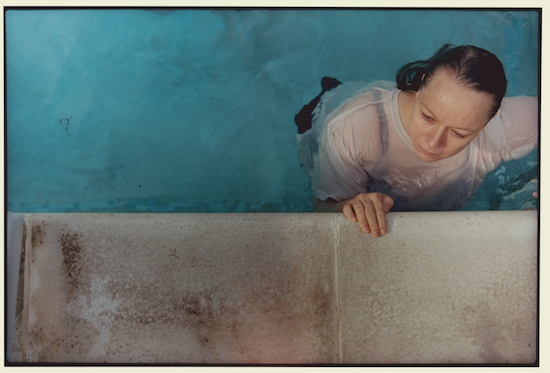Family dysfunction has long been a stable topic for filmmakers but it has rarely been presented in as stark and minimalist a fashion as in Tom Beard’s Two for Joy. Samantha Morton, who has been in surprisingly few films in recent years, stars as Aisha, a widowed mother suffering from depression following the death of her husband. She barely leaves the house and at times struggles to get out of bed. She is unable to control her son Troy (Badger Skelton), who despite his young age enters and leaves the house as he wishes, and is reliant on her daughter Violet (Emilia Jones) to complete even the most basic chores.
Troy is excluded from school and has a sense of isolation comparable to the young leads in This is England, The Selfish Giant, and Kes. Much like Billy in Kes, Troy finds comfort in escaping his usual surroundings and is a keen fisher. Violet finds it harder to escape and spends most of her day either revising for her GCSE exams or caring for her mother.
As an attempt to lift her mother’s mood and keep her brother out of trouble, Violet suggests they travel to the coast and stay at their father’s caravan. The surroundings are beautiful, but yet another tragedy threatens to fracture the fragile family.
First time director Tom Beard is able to bring poeticism to the film’s realistic style. Like the early work of Lynne Ramsay or Clio Barnard, Beard finds beauty in the sad and sometimes bleak surrounds he finds himself exploring. It is hard not to share producer Sadie Frost’s assertion that Beard is a “huge talent.” I would not be surprised if Beard become a prominent voice within British cinema in the coming years and there is plenty in Two for Joy to suggest that he has the potential to create some truly outstanding films.
At the moment his work still has some rough edges, chief among them a script that is workable but could have been fleshed out more. For the most part he focuses more on imagery than dialogue and more on mood than plot. Rather than delving into themes of depression and trauma, Beard for the most part merely observes them.
It helps that Beard has an actor of Samantha Morton’s quality at the centre of the film. Morton is almost unrecognisable as the withdrawn mother. She lives off a diet of microwave meals and spends most of her days lying in bed or watching TV in a dressing gown. Morton is brilliantly able to flesh out a character who has few lines or memorable actions. Aisha is completely cut off from the world around her and we rarely see inside her mind and can often feel one removed from her.
This is of course how Violet feels and as a viewer you often feel as if you are seeing everything unfold from her eyes. She is the most relatable of all the characters and it is easy to share her frustrations. Each member of the family is unable to talk about their pain and is left isolated in a position of sadness and sorrow. The film is heart breaking because it shows how far someone can sink before they realise they need help.
Cast in a supporting role, Billie Piper, who plays Lillah, similarly finds herself in a situation she is unable to cope with. She is also staying at the caravan park, which is run by her brother Lias (Daniel Mays), and is attempting to separate herself from the problems she faces.
Lillah is combative and emotional and in many ways the antithesis of Aisha. The one thing they do have in common are their troublesome children. Lillah’s daughter Miranda strikes a friendship with Troy and it isn’t long before they begin leading each other astray. For the most part they get away with some petty theft but there is a sense that harsher consequences lie ahead. Miranda, who is a couple years older than Troy, is the main instigator and it is easy to feel for Troy who is being led into actions he is not comfortable with.
A troubled and estranged relationship between Lillah and a man who is presumably Miranda’s father is clearly influencing the young girl’s actions. Like many of the other characters in the film, Miranda is unable to properly express her sadness and her feelings mainly result in anger towards those around her. Everyone in the film seems to have their own demons that are both traumatising and inescapable.
Lillah, in very different ways to Aisha, is out of her depth and is at a loss when it comes to controlling Miranda. The former Doctor Who star is very committed to her role and gives a credible if unremarkable performance. She lacks the naturalism of Morton and there are several moments when you can see that she is acting. Rather than inhabiting her role, she is reactive and slightly removed from the rest of the drama. It is the kind of performance that shows an actor still finding their way on the big screen and leads to her storyline feeling a little clichéd.
In the end, Two for Joy is an assured debut that poetically addresses tricky subject matter. It is a beautifully crafted and emotionally rich drama that will surely go down as one of the best British films of the year. Perhaps in the future Tom Beard will be able to match the British filmmakers who have clearly inspired him.
Two For Joy is in UK cinemas from Friday 28 September


